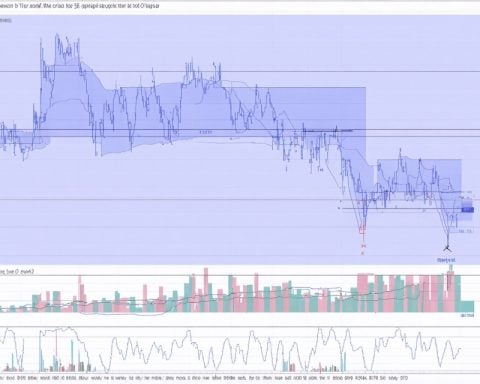In an exciting turn of events, the U.S. stock market experienced an uptick on Thursday, driven largely by impressive earnings reports from tech powerhouse Nvidia and others. The S&P 500 marked a 0.5% increase, swinging between gains and losses during the day’s trading session. Remarkably, banks and smaller companies, often buoyed by a robust economy, played a leading role in this positive trend, while the Dow Jones industrial average soared by 1.1%. The Nasdaq composite saw a slight uptick of less than 0.1%.
Nvidia, a giant in AI chip production, captured attention with a modest rise of 0.5% after surpassing analyst expectations for both profit and revenue. Although investor enthusiasm initially wavered following its earnings report, perceptions shifted as Nvidia’s guidance for upcoming revenue exceeded expectations, fueling optimism in the market. Expert analysis from financial circles deemed the report flawless, boosting confidence further.
In cryptocurrency, Bitcoin made headlines by briefly crossing the $99,000 threshold, reflecting a doubling of its value this year. The digital asset’s volatility persisted, however, as it settled around $98,000. Market dynamics were influenced by Gary Gensler’s announcement to resign as Chair of the SEC, an individual known for his stringent regulatory stance on cryptocurrencies.
While Nvidia and Bitcoin dominated discussions, other companies such as Snowflake and BJ’s Wholesale Club also experienced significant share price surges, indicating strong financial performances that outstripped expectations.
On a global scale, markets displayed varied responses, with India’s Adani Enterprises facing a sharp decline after legal challenges against its founder. Meanwhile, the fluctuating oil prices and mixed economic reports highlighted the ongoing complexities within the financial ecosystem.
The Hidden Impact of Market Surges: Beyond the Headlines
The recent spike in the U.S. stock market, highlighted by notable earnings from tech giant Nvidia and a brief Bitcoin boom, underscores a broader narrative involving the intertwined realities of economies, industries, and communities across the globe. While headline figures paint an optimistic picture, there are numerous dimensions worth exploring that ripple through societies in unexpected ways.
Hidden Beneficiaries and Overlooked Sectors
One surprising element in the recent market surge is the pivotal role played by banks and smaller companies. Typically, these entities thrive on the ripple effects of a strong economy. This is advantageous for small business owners and local economies, which often benefit from increased access to capital and improved consumer confidence. Yet, it raises questions about the sustainability of such trends: Are these gains a temporary benefit from favorable conditions, or are they indicative of a more permanent shift in market dynamics?
The Ripple Effect on Communities
With Nvidia surpassing expectations and Bitcoin’s unexpected surge, investors and stakeholders within the tech and crypto sectors find themselves grappling with new realities. Communities surrounding technology hubs, like Silicon Valley and emerging tech cities, experience both excitement and trepidation. Real-estate prices, already a concern in tech-driven cities, might escalate further, pushing the cost of living higher for local residents.
Global Disparities Magnified
Interestingly, while businesses in the U.S. ride a wave of success, international markets present a more complex picture. Legal challenges faced by entities like India’s Adani Enterprises highlight geopolitical and local economic vulnerabilities. This disparity prompts reflection on how synchronized or disconnected global economies truly are. Such asymmetry in market responses could exacerbate economic inequalities, both internationally and within countries.
Advantages and Disadvantages: A Balanced View
A key advantage of the current market trends is the renewed investment into tech and financial sectors, potentially leading to job creation and innovation. On the downside, heightened market volatility particularly in cryptocurrencies like Bitcoin—and uncertainties over regulatory frameworks following figures like Gary Gensler’s resignation—pose risks for retail investors and those lacking financial literacy.
Navigating the New Normal: What’s Next?
The burgeoning role of AI, as evidenced by companies like Nvidia, and the complex web of cryptocurrency investments beg the questions: What safeguards are in place for everyday investors? How should communities prepare for economic cycles influenced heavily by such unpredictable factors?
While the answers are multifaceted, education and awareness are paramount. Individuals must be proactive in understanding financial markets as broader economic cycles impact personal finances, employment, and local economies.
For further insights into how these financial developments ripple through various aspects of life, visit the following resources:
– Bloomberg
– CNBC
– Forbes
Understanding and adapting to these financial shifts can empower individuals and communities to better navigate the unpredictable landscape of the modern economy.























